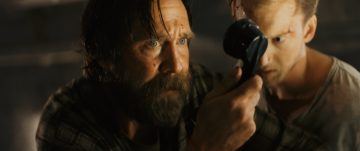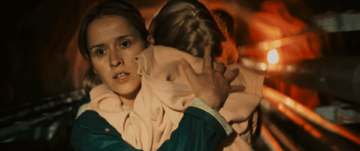by Alexander C. Kafka

A lyrical disaster movie? That sounds like a contradiction in terms, yet the Swedish collective Crazy Films delivered just that in 2018 with The Unthinkable, and it is arriving on American platforms this month.
The picture is a hybrid of Swedish family drama and low-budget but well-executed calamity, as though a late-career Ingmar Bergman decided to make a contemporary apocalyptic film with Roland Emmerich as an advisor. It’s toward the milder end of perpetual Hollywood bombast, which only makes it more effective because its moments of terror swoop in hawk-like and leave you dazed, just like the film’s protagonists.
Crazy Films is five guys who have been making movies together since they were kids. Their previous works were shorts on YouTube, so the sustained, polished handling of on-set, model, and CGI mayhem here is really remarkable, as is the existential subtext and the unapologetically dour nature of its hero.
That would be Christoffer Nordenrot as Alex, who is, refreshingly, not a hunky, affable neighborhood firefighter or ex-special ops officer in need of redemption, the way he surely would be in the analogous American version. Rather, Alex is a beady-eyed emo-rock-fusion keyboardist with misanthropic tendencies. Those are largely due to his rough childhood with a domineering, alcoholic veteran father, Björn (Jesper Barkselius), whose apparent PTSD has made him a powder-keg conspiracy nut obsessed with the prospect of invasion from an autocratic powerhouse to the East.

But as the old saying goes, just because you’re paranoid doesn’t mean they’re not out to get you. Such seems to be the case here. Although not fully spelled out, a sudden rash of bombings, nerve-agent rainstorms, and hellicopter gun assaults is, it is pointedly suggested, the doing of a Russian dictator whose last name rhymes with “gluten.”
There’s an initial 20-minute decade-ago backstory involving Alex’s circumstance-sundered teenage romance with Anna (Lisa Henni). With their hushed flirtations and quiet hand-by-hand piano improvisations, they’re like juxtaposed flowers waiting to bloom together, but plucked prematurely. Anna’s mother is a high government official who needs to move from the countryside to Stockholm, and Alex doesn’t have the self confidence to suggest a long-distance romance when Anna goes with her.
Flash forward to Alex the emo star, who returns to his rural hometown in search of a beat-up church piano he feels has more soul than his concert Beckstein. He reconnects with Anna in a warm but tentative manner, but years of intervening history, not to mention hell-bent invading troops, have a way of interfering with rekindled romance.
Meanwhile, the scrappy, nutty, now-bearded Bjorn takes it upon himself to single-handedly defend the power substation where he works. Adding to the surreal sensibility of all this, the action takes place during mid-summer festival. If you saw Ari Aster’s 2019 horror film Midsommar, you can guess that all will not go as the white-linened, wreathed innocents might hope.
Music plays an intriguing and integral part in the production, with Alex and Anna’s acoustic-piano theme and the electrified essence of his stage performance wending their way into the score. After a year in which various unthinkables have become all too thinkable, those notes linger in the viewer’s mind, echoing this highly original work of terror, melancholy, and beauty.
